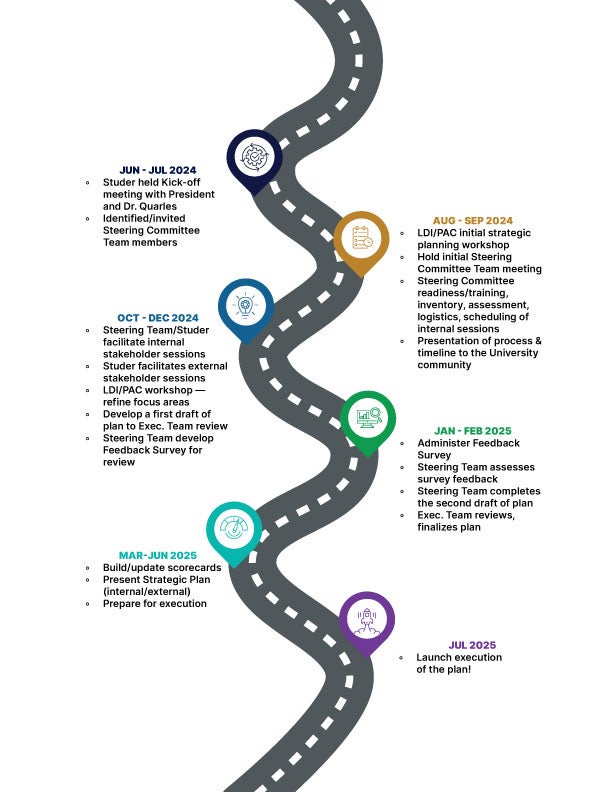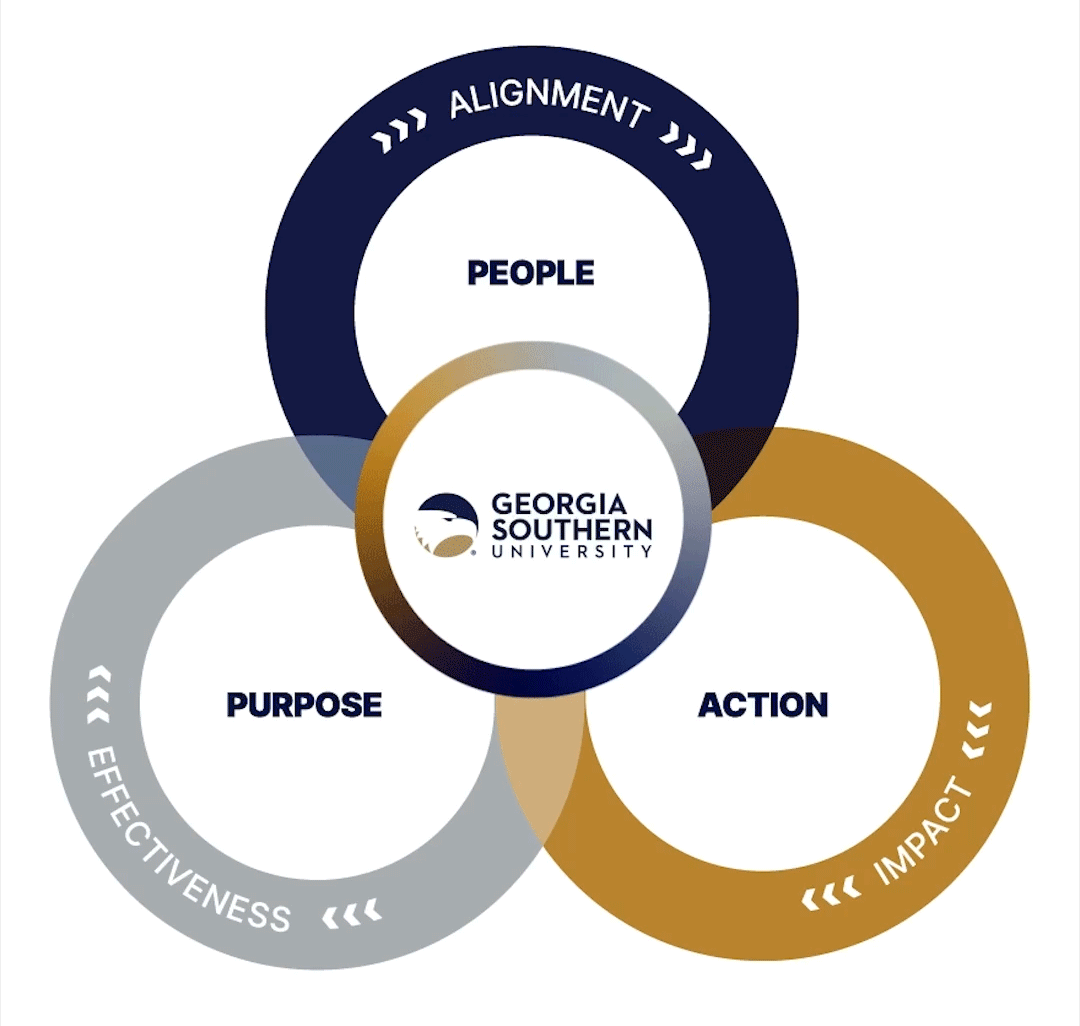People. Purpose. Action.
Bringing Our Vision To Life
Our Vision: People. Purpose. Action: Growing ourselves to grow others.
At Georgia Southern University, our vision is rooted in the transformative power of People. Purpose. Action: Growing ourselves to grow others. We are committed to empowering individuals, driving meaningful change, and creating measurable impacts that enhance lives and communities. Through a focus on transparency, engagement, and personal and professional growth, our people are at the heart of everything we do. With a purpose grounded in student success and excellence in research, teaching, and service, we prepare our people to lead with intention and contribute to a thriving society. Through our actions, we hold ourselves accountable to high standards of continuous improvement to ensure market alignment, public impact, and operational efficiencies and effectiveness. Together, we are transforming lives and communities, building a brighter future for all.
Download the Full Strategic Plan Download the Strategic Plan KPI Grid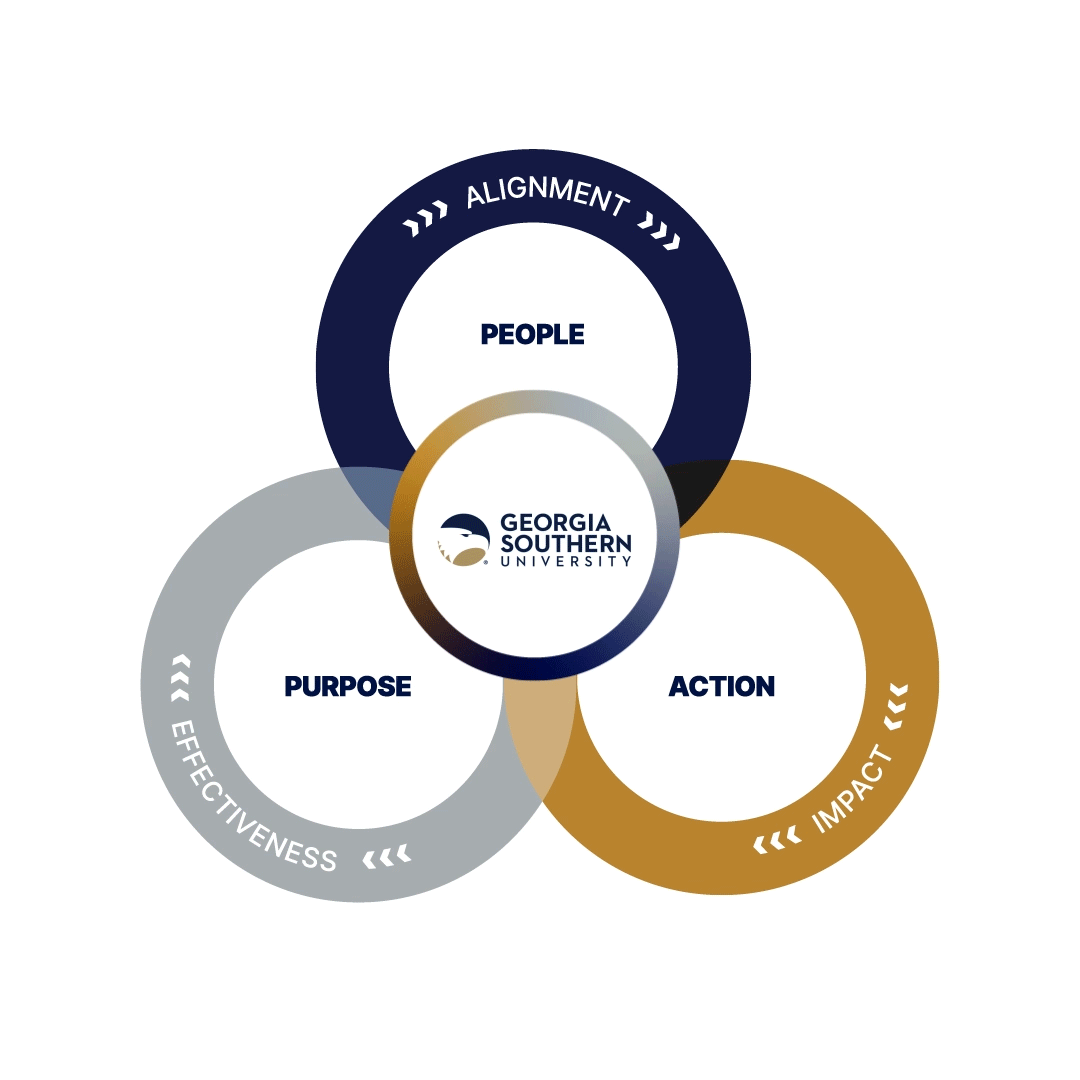
Mission, Vision & Values
Georgia Southern University impacts the future by fostering a transformative learner-centered culture. We empower students, faculty, staff, and alumni to lead, serve, and engage, enhancing the quality of life through educational excellence, impactful research, cultural enrichment, and meaningful contributions to communities locally and globally.
People. Purpose. Action: Growing ourselves to grow others.
- Innovation and Discovery
We advance knowledge and foster transformative research through creativity, collaboration, and strategic investment, elevating the institution’s meaningful contributions to scholarly excellence.
- Mobility
We foster economic and social mobility by equipping our people with the skills, knowledge, and opportunities needed for career readiness, workforce alignment, and meaningful contributions to an ever-changing world.
- People
We value the unique contributions of all members of our community, fostering growth, collaboration, and success through a commitment to their holistic development and achievement.
- Academic Excellence
We are committed to fostering academic excellence by empowering our people through innovative teaching, impactful research, and professional development to drive discovery and meaningful contributions to society.
- Collaboration
We foster collaboration through shared governance, teamwork, and partnerships that promote innovation, collective problem-solving, and meaningful engagement across our community.
- Transparency and Integrity
We consistently uphold our integrity through accountability, openness, and transparent decision-making, fostering trust to empower our people to make informed decisions.
- Sustainability
We value responsible resource management and thoughtful practices that promote resilience, well-being, and long-term success for our institution and communities.
Our People…
At Georgia Southern University, our People are the heart of our institution, encompassing faculty, staff, students, alumni, and the communities we serve and aspire to impact. We are committed to the academic, personal, and professional growth of our people and offer personalized support and meaningful experiences that motivate them to reach their fullest potential. Together, we foster an environment that encourages our people to engage, one that ensures their open exchange of ideas and opinions, respects the individuality and beliefs of all, and embraces a culture where every Eagle is inspired to grow themselves to grow others.
The following goals and actions will shape our path forward:
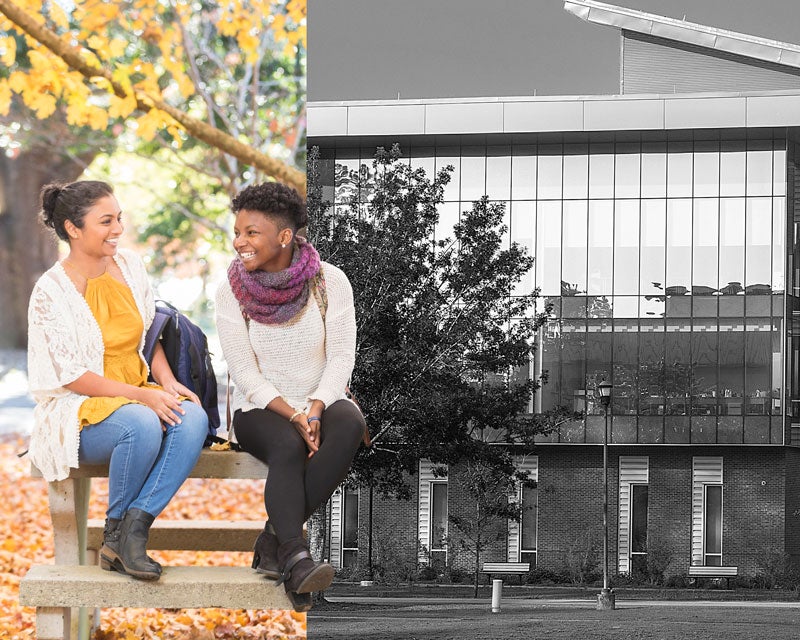
○ ACTION 1.1: Strengthen accountability and performance tracking at multiple levels of leadership
○ ACTION 1.2: Enhance and assess internal communication strategies to improve information sharing
○ ACTION 1.3: Enhance and assess external communication strategies to improve institutional awareness
○ ACTION 2.1: Promote well-being for students
○ ACTION 2.2: Promote well-being in the work environment for faculty and staff
○ ACTION 2.3: Increase engagement on all campuses
○ ACTION 3.1: Strengthen the orientation experience for faculty, staff, and students
○ ACTION 3.2: Expand opportunities for professional development
○ ACTION 3.3: Expand opportunities for leadership development
○ ACTION 3.4: Promote opportunities for mentorship throughout the Georgia Southern community
Our Purpose…
At Georgia Southern University, our Purpose is to provide transformative opportunities that enhance the quality of life for our people, strengthen communities, and advance the region and world around us. Through student support, research, teaching, and service, Georgia Southern University acts as a catalyst for discovery, innovation, economic growth, and the transmission of knowledge and understanding. We inspire individuals to soar beyond, enact productive change, and lead with purpose.
The following goals and actions will shape our path forward:
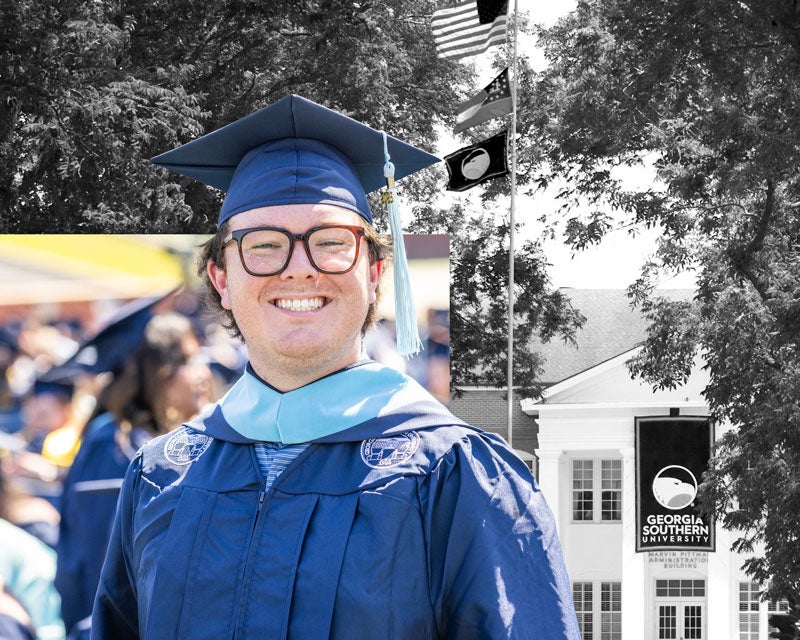
○ ACTION 4.1: Fully implement Ready Day 1 Connect
○ ACTION 4.2: Expand and strengthen pathways to student success
○ ACTION 5.1: Advance research infrastructure and support
○ ACTION 5.2: Cultivate graduate program growth and support
○ ACTION 5.3: Strengthen faculty research support
○ ACTION 6.1: Expand practices that facilitate excellence in teaching
○ ACTION 6.2: Enhance the student learning experience by promoting high-quality instruction and experiential learning
○ ACTION 7.1: Expand partnerships with the local, regional, and global community
○ ACTION 7.2: Support economic growth and regional prosperity
Our Actions…
At Georgia Southern University, our Action embodies our commitment to continuous improvement. We hold ourselves accountable with key performance indicators in transparent leadership scorecards, quarterly tasks, employee engagement action plans, and aligned budget and strategic planning processes. Guided by market alignment and relevance, operational effectiveness and efficiency, and community impact and vibrancy, we continuously implement and assess strategies that reflect a relentless focus on achieving excellence by connecting our People to our Purpose.
The following goals and actions will shape our path forward:
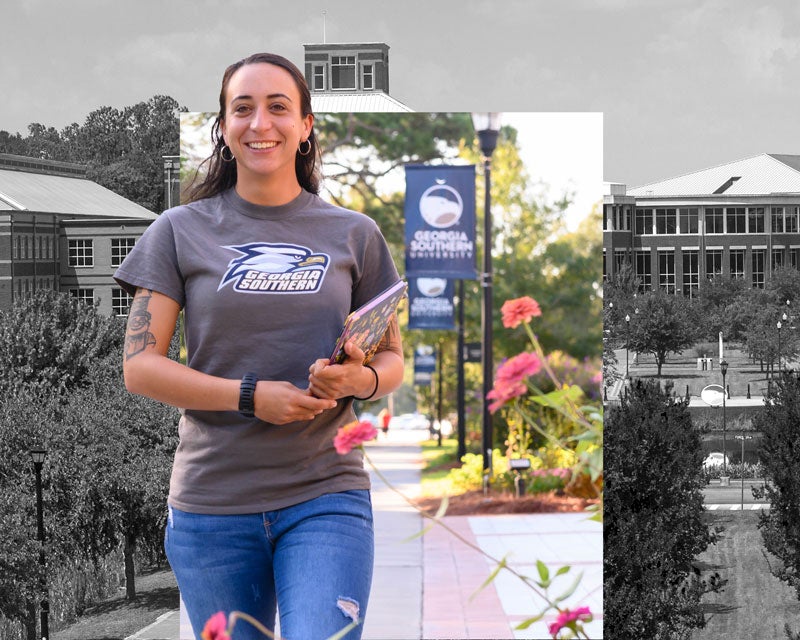
○ ACTION 8.1: Facilitate a comprehensive, coordinated, and differentiated student success model
○ ACTION 8.2: Develop, market, and support GS Online
○ ACTION 8.3: Strengthen and align the undergraduate to graduate pipelines
○ ACTION 8.4: Elevate Georgia Southern’s recruitment and engagement efforts in the Metro Atlanta area
○ ACTION 8.5: Enhance enrollment processes and efforts at our open access campuses
○ ACTION 9.1: Amplify the public impact of research by advancing solutions in key research impact areas
○ ACTION 9.2: Advance philanthropic engagement
○ ACTION 10.1: Develop and implement a transparent and automated transfer admission process
○ ACTION 10.2: Streamline the commitment and onboarding process for incoming students
○ ACTION 10.3: Enhance budget alignment with institutional priorities while leveraging automation and process improvements to enhance agility and sustainability
○ ACTION 10.4: Expand leadership scorecards to enhance accountability, performance tracking, and data-informed decision-making
Strategic Planning Process…
In the summer of 2024, Georgia Southern University President Kyle Marrero launched the strategic planning process by appointing Dr. Dominique A. Quarles to chair this effort and establish the Strategic Planning Steering Committee. Together, they identified key
institutional leaders to serve on the committee, representing every division, college, and shared governance group to ensure broad input and alignment in shaping the university’s strategic direction. As part of this effort, the university partnered with Studer Education to serve as a thought partner to assist in the strategic planning process. The Strategic Planning Steering Committee Technical Assistance Team was an additional team of leaders identified to support the committee by providing technical guidance and insights. The planning also included the Executive Committee, comprised of members of the President’s Cabinet, who were responsible for approving the plan and finalizing the alignment of our key performance indicators (KPIs).
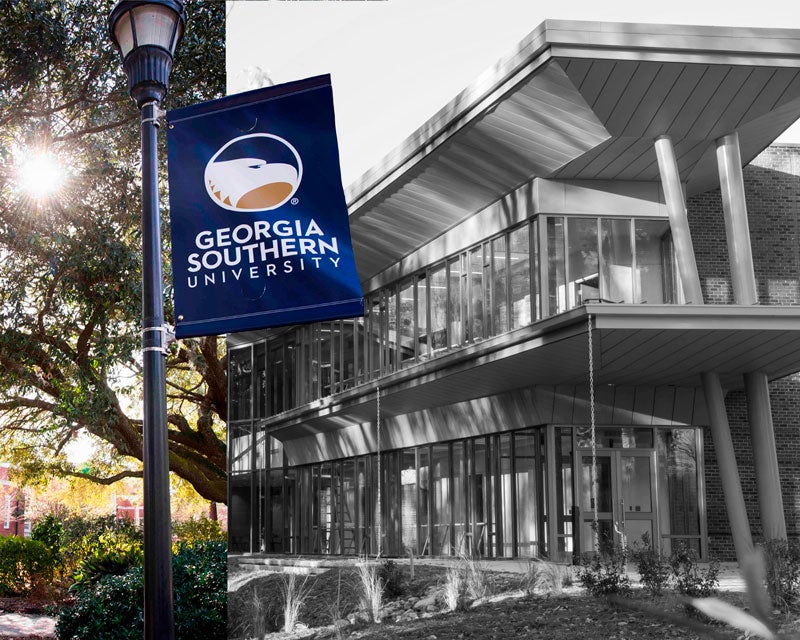
Strategic Planning Steering Committee
At the direction of the President, this committee was charged with:
- Facilitating a collaborative planning process that engaged stakeholders from across the university and beyond.
- Aligning the strategic plan with our mission, vision, and values to ensure a cohesive and forward-thinking approach.
- Incorporating insights from current initiatives, such as enrollment planning, academic program prioritization, and organizational effectiveness.
- Identifying goals, strategies, and measurable outcomes to drive continuous improvement and innovation.
- Ensuring the plan reflects our commitment to student success, research excellence, community impact, and institutional resilience.
- Dominique A. Quarles, Ph.D. – (Committee Chair) Associate Vice President for Organizational Effectiveness, Leadership Development and Engagement
- John Banter, Ed.D. – (Strategic Planning Administrator) Director of Organizational Effectiveness
- Allen Amason, Ph.D. – Dean, Parker College of Business Administration
- Lisa Carmichael, Ph.D. – Executive Chief Librarian, University Libraries
- Brandy Clouse – Deputy Athletics Director, Athletics
- Finbarr Curtis, Ph.D. – Professor, Faculty Senate President
- Aileen Dowell, Ph.D. – Associate Vice President/Dean of Students, Student Affairs
- Steven Engel, Ph.D. – Dean, Honors College
- Delena Gatch, Ph.D. – Associate Vice President of Institutional Assessment & Accreditation, Academic Affairs
- Julie Gerbsch – Executive Director of Development, University Advancement
- Rami Haddad, Ph.D. – Interim Dean, College of Engineering and Computing
- Michael Huggins, Ph.D. – Dean, College of Science and Mathematics
- Justin Janney – Associate Vice President, Business and Finance
- Jodi Kennedy, Ed.D. – Director of Leadership & Community Engagement, Staff Council Chair
- John Kraft, Ph.D. – Interim Dean, College of Graduate Studies
- Amy Lingo, Ed.D. – Dean, College of Education
- Kendria Lee – Associate Vice President, External Affairs
- David Owen, Ph.D. – Dean, College of Arts and Humanities
- Joshua Parker – Student Government Association Representative
- Stephen Rossi, Ph.D. – Interim Dean, Waters College of Health Professions
- Ryan Schroeder, Ph.D. – Dean, College of Behavioral and Social Sciences
- Stuart Tedders, Ph.D. – Dean, Jiann-Ping Hsu College of Public Health
- Jessica Williamson, Ed.D. – Assistant Vice President of Student Success and Academic Support Services, Enrollment, Marketing, and Student Success
- Meca Williams-Johnson, Ph.D. – Associate Dean, College of Education
Technical Assistance Team
- Ashlea Anderson – Chief Information Officer, Business and Finance
- Vickie Cobb – Associate Vice President of Human Resources, Business and Finance
- Chris Olson, Ph.D. – Director of Institutional Research, Enrollment, Marketing, and Student Success
- Brad Sturz, Ph.D. – Assistant Vice President of Institutional Assessment and Accreditation, Academic Affairs
- Jennifer Wise – Director of University Communications
Executive Committee
- Kyle Marrero, D.M.A. – President
- Trip Addison – Vice President for University Advancement
- Annalee Ashley, Ed.D. – Vice President for External Affairs, Communications, and Strategic Initiatives; Chief of Staff to the President
- Maura Copeland – Executive Counsel
- Chris Davis – Director of Athletics
- Shay Little, Ph.D. – Vice President for Student Affairs
- Dominique A. Quarles, Ph.D. – Associate Vice President for Organizational Effectiveness, Leadership Development and Engagement
- Carl Reiber, Ph.D. – Provost and Executive Vice President for Academic Affairs
- Alejandra Sosa Pieroni, Ed.D. – Executive Vice President for Enrollment, Marketing, and Student Success
- Ron Stalnaker – Vice President for Business and Finance
- David Weindorf, Ph.D. – Vice President for Research and Economic Development
Strategic Planning Timeline
Through consultation with Studer Education, the following timeline for the planning
process was developed, and elements of this process are outlined below:
